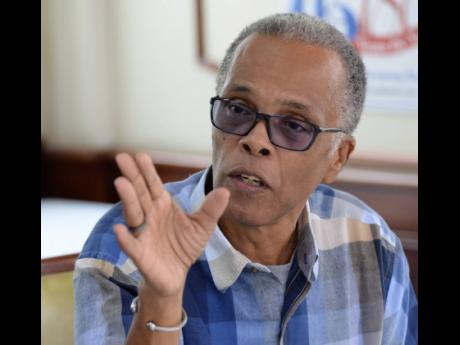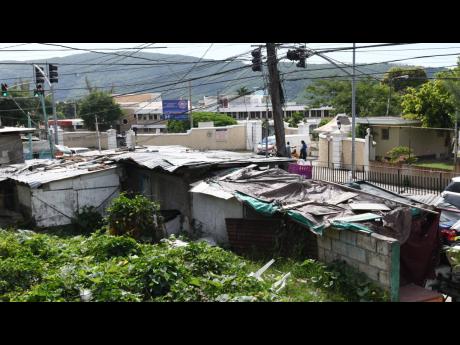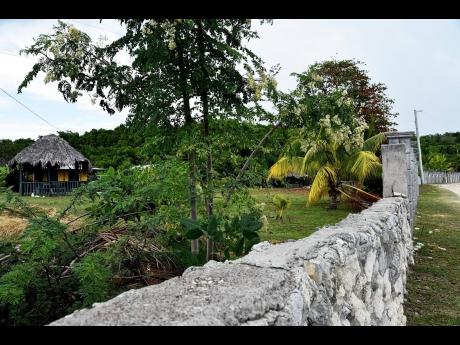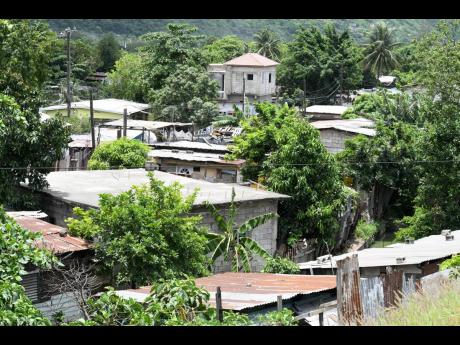Squatting is accepted political corruption, says analyst
There is no political will to solve the problem of squatting, as politics is the biggest beneficiary, noted outspoken political scientist, public commentator and attorney-at-law, Dr Paul Ashley.
“Why would anyone want to solve squatting when every pocket of squatting benefits the politics? Squatting is both a political benefit, as well as an economic benefit. Just look at how many structured communities in Kingston are surrounded by squatters,” Ashley reasoned.
Backed largely by politicians who quietly support their action, for decades squatters have taken control of lands belonging to private individuals, churches and the Government, mushrooming in nearly all the parishes.
Despite various studies, including one from the 1970s done by Professor Carl Stone, there is still no accurate number of those occupying lands illegally in Jamaica, but an estimated 20 per cent of the country’s three million people are living on lands they have captured, some for as many as four generations.
Everald Warmington, minister without portfolio in the Ministry of Economic Growth and Job Creation, asked The Sunday Gleaner for a week to provide more accurate data on informal settlements.
In his recent Sectoral Debate presentation, he said the Squatter Management Unit (SMU) has been commission to do a National Squatter Survey.
“The policy aims to promote the optimal use of land and land resources, meet the need for shelter and other uses in a structured, coordinated, and sustainable manner, and respond to the diverse needs of society’s most vulnerable members,” Warmington said.
According to him, the survey aims to support the classification of squatter settlements in tiers to better assist in planning; establish a geo-database using settlement boundary and household data; and inform the National Squatter Management Policy and Implementation Plan, with the aim to facilitate the gradual reduction and eventual elimination of all forms of squatting throughout Jamaica.
Approximately 30 surveys will be conducted, 23 of which are subdivision surveys, to facilitate the issuance of 735 new certificates of title, which has been ongoing under the Land Administration and Management Programme (LAMP). The National Housing Trust committed an initial $37.8 million towards the project, but the SMU said it was insufficient and requested more funds.
But Jamaica is not short on studies conducted by various agencies over the years and nearly all of the country’s members of parliament (MPs) have pockets of squatter settlements in the constituencies they represent. Land-titling efforts go back to the 1960s when the late Norman Manley initiated activities that gave ownership to occupiers of property in Manchester.
But after decades of endless programmes, the problem persists.
“Most political garrisons began with squatter settlements and they are critical to them. And one of the reasons why you can’t resettle or get the proper infrastructure is that you will be displacing people who have political allegiances and they will impact the ballot boxes. But no country that is serious about policing and crime solving can operate with squatter settlements. They cannot be policed,” Ashley argued.
Illegal occupation has long threatened the safety of residents in the areas they live, among them eruption of violence, flooding and environmental pollution.
“Look at the settlement in front of the University Hospital. It’s a disgrace. Can it be policed? No. Now they have been emboldened to provide rental facilities. Many houses there offer accommodation to university students. So it has become legal, transactional and economical,” Ashley stated.
“When you bulldoze squatters, you have to go to high-rise buildings, because land is a scarce commodity in a small country. If you do not have the facility to construct multi-story buildings to keep your supporters together, then leave them alone,” he suggested.
‘POLITICAL GERRYMANDERING’
For Ashley, the politicians have crafted a way to benefit from “organised political gerrymandering by supporting the pockets of squatting to impact election outcomes.”
Gerrymandering refers to changes in electoral boundaries to take pockets of political support to benefit a party. In the United States, Republicans have redrawn electoral boundaries in several states to gain political advantage over rivals. There have been similar accusations in Jamaica and for the most part, moves by different administrations to legalise tenure in some instances have been vigorously, vociferously and/or quietly opposed.
Programmes such as Operation PRIDE were used by the PJ Patterson-led administration to provide a remedy.
While politicians have purchased some disputed properties to keep pockets of support, constituencies with an oversupply of voter support have been encouraged to register to vote in other constituencies that are marginal. Some believe this was how the People’s National Party (PNP) was uprooted by the Jamaica Labour Party (JLP) in St Ann North West. The seat was previously won by the PNP for decades.
LOCKED IN A BATTLE
Alimi Banjoko represents the owner of the more than 4,000-acre Little Bay property in Westmoreland. Hundreds of residents occupy the area, some for decades, while others have purchased lands from individuals not authorised to sell. They are now locked in a battle with developers for the lands.
“The owner has been encouraged by the action and speeches of the prime minister with respect to the right of individuals to obey the rule of the court and supremacy of the rule of law. She is optimistic that the matter will be resolved in consistent with the rule of law,” Banjoko said last week.
Recent eviction attempts in Little Bay were met with threats to physically harm individuals and destroy by fire the heavy machinery being used.
One affected squatter said they were “encouraged by influential people in the ruling party to switch votes. People were paid to vote.”
The Church is not spared from the impact of squatting, as the Moravian Church said they have lost more than 4,000 acres of property to informal settlements. However, a representative of the body said they are mindful of their purpose and are not fighting the occupants.




